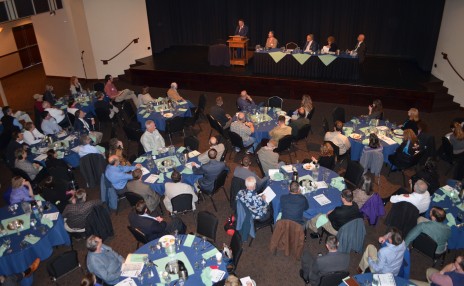H2O Breakfast serves up more than water
Over 145 opinion leaders attended the Spokane River Forum’s H2O Stormwater Breakfast. Momentum is on the Spokane River’s side as talking clean water is working in concert with new ways and opportunities to enjoy this iconic resource. Just look around: the Huntington Park dedication, Spokane River Water Trail and Centennial Trail improvements, the Riverfront Park Master Plan, Expo ’74 Celebration, and the Convention Center Expansion are some examples.
So why would 150 folks from the community want to talk stormwater? Answer: Because the City of Spokane is proposing to make a $300 million Integrated Clean Water Plan investment. When you add to that clean water investments being made and planned by upstream public and private dischargers into the river, the regional investment over the next five to ten years will be well over $700 million.
 From Mayor Tom Weisner, participants heard how Aurora, Illinois approached similar challenges to meet the needs of the Fox River. Like Spokane, the Fox runs through the center of their city. And like Spokane and other regional players are understanding, a key to their success is making clean water investments in a manner that not only meet clean water standards, but serve as a driver for economic development.
From Mayor Tom Weisner, participants heard how Aurora, Illinois approached similar challenges to meet the needs of the Fox River. Like Spokane, the Fox runs through the center of their city. And like Spokane and other regional players are understanding, a key to their success is making clean water investments in a manner that not only meet clean water standards, but serve as a driver for economic development.
As Spokane Mayor David Condon puts it in his presentation, the goal is to be both “environmentally and financially responsible.” Spokane Utilities Director Rick Romero provided an overview of the plan and the philosophies driving its development.
Post Falls Mayor Ron Jacobson discussed their clean water efforts, showing that on a per capita basis, members of their community will need to invest about twice as much to meet water quality standards. But be it Spokane, Post Falls or other communities in the region, contentiousness and prospects for litigation have dimmed considerably over the past five years. The story now is that plans are being approved and investments being made!
Stormwater is also becoming a major influence in rural communities as well. Tanyalee Erwin from the Washington Stormwater Center provided information and context about the activities of counties, municipalities and businesses throughout eastern Washington as they navigate the complexities and challenges of controlling and managing stormwater. In northern Idaho, the Panhandle SEEP (Stormwater Erosion and Education Program) is providing similar services.
Click here to view Power Point presentations.
Thank you again to our H2O Breakfast sponsors: the Washington Department of Ecology, Idaho Department of Environmental Quality, the Spokane Tribe of Indians, the Coeur d’Alene Tribe of Indians, the Kootenai County Aquifer Protection District, CH2MHill, and Panhandle SEEP.
Note: This article was partially funded through a grant from Washington Department of Ecology. While these materials were reviewed for grant consistency, this does not necessarily constitute endorsement by the Department.
